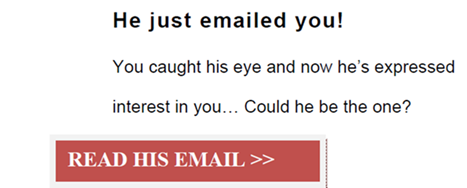If you had a free Match account and got a message from another user, Match would send you a notice like this one to encourage you to “read his email” (or hers)…which required you to subscribe and pay:

But the person whose eye you caught? Match had already identified many of them as likely scammers. So if you paid Match to read that message, you might have found either a scammer or an empty inbox, instead of, possibly, “the one” Match advertised. That’s deceptive, the FTC says.
Even worse, says the FTC, is that Match had blocked some of these suspicious accounts from sending messages to its paying subscribers, but didn’t give the same protection to free account users. The people who then subscribed in response to these messages could have been exposed to scammers. The FTC says that practice is unfair, placing people at risk of romance scams so that Match could make more money.
FTC data show that romance scams are on the rise. So how to protect yourself if you’re still looking for love in online places?
- Listen for details that don’t add up, and do a reverse-image search on profile pictures. If those pics show up with someone else’s name, you’ve found a scammer.
- If an online sweetheart you haven’t met in person asks you for money, stop. That’s always a scam.
- Talk to someone you trust about this love interest – and pay attention if friends or family are concerned.
- Learn more at ftc.gov/imposters.
If you think you’ve encountered a romance scammer on an online dating site, report it to the website and to ftc.gov/complaint. Watch this video to learn more about romance scams.




